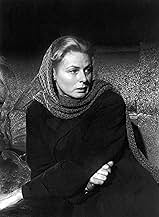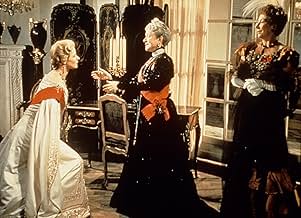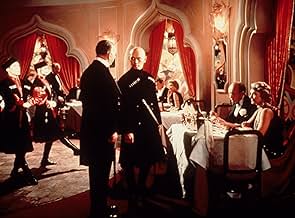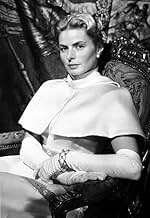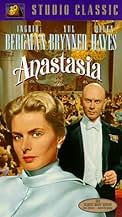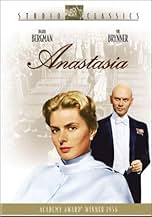IMDb-BEWERTUNG
7,0/10
9948
IHRE BEWERTUNG
Ein opportunistischer russischer Geschäftsmann präsentiert eine geheimnisvolle Betrügerin als Großherzogin Anastasia. Doch sie ist so überzeugend in ihrer Leistung, dass selbst die größten S... Alles lesenEin opportunistischer russischer Geschäftsmann präsentiert eine geheimnisvolle Betrügerin als Großherzogin Anastasia. Doch sie ist so überzeugend in ihrer Leistung, dass selbst die größten Skeptiker ihr glauben.Ein opportunistischer russischer Geschäftsmann präsentiert eine geheimnisvolle Betrügerin als Großherzogin Anastasia. Doch sie ist so überzeugend in ihrer Leistung, dass selbst die größten Skeptiker ihr glauben.
- Regie
- Drehbuch
- Hauptbesetzung
- 1 Oscar gewonnen
- 7 Gewinne & 6 Nominierungen insgesamt
Sacha Pitoëff
- Piotr Ivanovich Petrovin
- (as Sacha Pitoeff)
Grégoire Gromoff
- Stepan
- (as Gregoire Gromoff)
Ina De La Haye
- Marusia
- (as Ina de la Haye)
John Adams
- Servant
- (Nicht genannt)
Paul Beradi
- Man in Bar
- (Nicht genannt)
Paul Bildt
- Bit Part
- (Nicht genannt)
Newton Blick
- Maître d'
- (Nicht genannt)
Ernest Blyth
- Ballet Patron
- (Nicht genannt)
Empfohlene Bewertungen
As the woman who may or may not have been the Grand Duchess Anastastia, Ingrid Bergman was welcomed back with open arms by the Hollywood fraternity that had spurned her after her affair with Roberto Rossellini and she won her second Oscar for her performance. It is a fine piece of acting in a film that is all about acting; (Bergman plays a woman called Anna Koreff who is being groomed to pass as the Grand Duchess, though it is no "Pygmalion" as she may well indeed have been the person she is being hired 'to play', though DNA tests later proved the woman in question was not Anastasia).
Yul Brynner is the Russian general who acts as her Professor Higgins and he's excellent. The same year he won an Oscar for "The King and I" but his performance here is just as good. Helen Hayes is superb as the Dowager Empress and there is a terrific turn from the great Martita Hunt as the Empress' lady-in-waiting. Anatole Litvak's direction isn't exciting in 'cinematic' terms but he knows he has a good yarn and he moves it along at a cracking pace. Between them, Bergman, Brynner and Litvak hold you in thrall.
Yul Brynner is the Russian general who acts as her Professor Higgins and he's excellent. The same year he won an Oscar for "The King and I" but his performance here is just as good. Helen Hayes is superb as the Dowager Empress and there is a terrific turn from the great Martita Hunt as the Empress' lady-in-waiting. Anatole Litvak's direction isn't exciting in 'cinematic' terms but he knows he has a good yarn and he moves it along at a cracking pace. Between them, Bergman, Brynner and Litvak hold you in thrall.
Not the most accurate rumination on whether or not Anna was really Anastasia, perhaps, but creamy, expensive entertainment, expertly done. Many share in the credit. There's a witty, epigrammatic screenplay by the always reliable Arthur Laurents (love that closing line, and most of Helen Hayes' dialogue) that manages to speculate perceptively on the nature-of-performance theme without beating it into the ground; an evocative Alfred Newman score that surpasses virtually anything else he did at Fox; fine CinemaScope photography that really uses the outer reaches of the screen, though it does dabble in spectacle for spectacle's sake at times; a superb Hayes (she could be theatrically actressy or resort to little-old-lady tricks in other movies, but here she's the real deal); a delightful Martita Hunt; and chemistry between Ingrid Bergman and Yul Brynner that suggests all the underlying sexual tension without ever stating it explicitly. Also knock-your-eye-out costume design. In a time of rampant Hollywood bloat and slow-moving epics, this one moves along, without too much pretension. And Anatole Litvak's direction, while no great shakes, is nicely paced.
What a wonderful movie!!!! They simply don't make them like this anymore. Start with the most mundane matters, the production values. The glorious wide screen aspect ratio is a delight, as is the wonderful Technicolor process, which gives us a vividness that is sorely lacking from movies nowadays. The great Alfred Newman wrote the score. Then consider the acting - first rate on all fronts. Yul Brynner and Ingrid Bergmann play beautifully off each other, and Akim Tamiroff shines in the type of role he excelled in, the sweaty, seedy, slightly comic con artist. Martita Hunt is wonderful as the slightly loony lady in waiting. Helen Hayes is off the charts as the Dowager Empress, in what was evidently a comeback role for her. To watch her display her ambivalent emotions as she deals with what could be her long-lost granddaughter are a revelation. Her wordless final embrace with Anna is a ten second master class in the heights to which great acting can rise through facial expression alone. Finally, the script; it impishly refuses to engage the central question - was Anna Anderson really Anastasia, or an impostor? (FYI, she was an impostor.) By the end, the question doesn't seem to matter, so beautifully has the script dealt with things like lost hopes, wishful thinking, doubt, deceit, treachery, nostalgia for a lost world, romance, and amnesia. Don't miss this great story, beautifully told in a lavish production.
8n-mo
"Anastasia" is not a film for everyone. Those who insist on historical accuracy in films depicting real people and events would do best to stay away from the movie house altogether. "Anastasia," however, is not exactly about real people, although it does incorporate the lives of real humans and parallels with their true stories to depict a compelling "what-if" scenario and this is incredibly effective, even after DNA tests have revealed that "Anna Anderson" was definitely not Anastasia Nikolavena Romanov but instead, in all likelihood a Kashubian factory worker. (I am unaware whether she ever used the name "Anna Koreff.")
As a matter of fact, those who are familiar with the real story are in for an even grander treat. We are thrown into 1928 Paris with a brief shot of this wretched madwoman at Russian Easter, lonely and rejected outside the Russian Orthodox Cathedral and on the brink of suicide, and we are definitely prepared to think of see as the impostor that "Anna Anderson" was. Yet as the film progresses, we are shown a woman quite literally without any past. Michael Thornton opined of the real "Anna Anderson," "Somewhere along the way she lost and rejected (Kashubian factory worker Franziska) Schanzkowska. She lost that person totally and accepted completely she was this new person."
Ingrid Bergman's Anna Koreff, however, is not simply mentally lost: the world has lost her as well. It helps, perhaps, that Bergman is infinitely more convincing as a princess than as a vagabond, and the retrospective certitude of the falsity of "Anna Anderson"'s claim helps to disguise her limits at the beginning of the film when, like Yul Brynner's General Bounine, we are meant to doubt her identity. Bounine creates Koreff's new identity as the Grand Duchess Anastasia, and so effectively that he begins to believe in it himself. But the entirely unsolvable questions remain:
Is Anna Koreff Anastasia? Does she actually believe she is Anastasia? More ominously, whoever she is, does she even truly and consciously remember?
This piece carefully avoids resolving these questions. On the one hand, the speed and thoroughness with which she slides into her new role is difficult to explain and impossible to deny. On the other hand, the ending (among other things) is cleverly constructed so as to expose her assumed royal identity as a construction. This is not, of course, the real story, and in the post-1900 world, such a thorough and complete break with any sort of past anchor is next to impossible. But if it happened... this may be just how it happened.
"Anastasia" is above all a beautifully designed film, full of elegance and taste. Ingrid Bergman is as beautiful as the interior architecture against which she assumes her royal identity. Again, it is not a film for everyone: many will have great difficulty connecting and sympathizing with the royal circles and personalities in this tome, but those who are able to understand pre-modern, pre-liberal (c.f. human) sensibilities will love it. Helen Hayes is absolutely perfect and inspiring as the Dowager Empress Maria Feodorovna (it is plain to see how the real Empress was so beloved in her adopted Russia), and her chemistry with Bergman is incredible to behold. The only thing I can find to critique is that the script--and to some extent a steely wall between Bergman and Brynner--does not fully back up the eventual culmination of the relationship between Koreff and Bounine; the conclusion fits quite well thematically but is mildly illogical with regard to the plot. Still, this is a minor complaint, as "Anastasia" is first and foremost a film about identity, and one that will jar and confound its viewers time and again.
As a matter of fact, those who are familiar with the real story are in for an even grander treat. We are thrown into 1928 Paris with a brief shot of this wretched madwoman at Russian Easter, lonely and rejected outside the Russian Orthodox Cathedral and on the brink of suicide, and we are definitely prepared to think of see as the impostor that "Anna Anderson" was. Yet as the film progresses, we are shown a woman quite literally without any past. Michael Thornton opined of the real "Anna Anderson," "Somewhere along the way she lost and rejected (Kashubian factory worker Franziska) Schanzkowska. She lost that person totally and accepted completely she was this new person."
Ingrid Bergman's Anna Koreff, however, is not simply mentally lost: the world has lost her as well. It helps, perhaps, that Bergman is infinitely more convincing as a princess than as a vagabond, and the retrospective certitude of the falsity of "Anna Anderson"'s claim helps to disguise her limits at the beginning of the film when, like Yul Brynner's General Bounine, we are meant to doubt her identity. Bounine creates Koreff's new identity as the Grand Duchess Anastasia, and so effectively that he begins to believe in it himself. But the entirely unsolvable questions remain:
Is Anna Koreff Anastasia? Does she actually believe she is Anastasia? More ominously, whoever she is, does she even truly and consciously remember?
This piece carefully avoids resolving these questions. On the one hand, the speed and thoroughness with which she slides into her new role is difficult to explain and impossible to deny. On the other hand, the ending (among other things) is cleverly constructed so as to expose her assumed royal identity as a construction. This is not, of course, the real story, and in the post-1900 world, such a thorough and complete break with any sort of past anchor is next to impossible. But if it happened... this may be just how it happened.
"Anastasia" is above all a beautifully designed film, full of elegance and taste. Ingrid Bergman is as beautiful as the interior architecture against which she assumes her royal identity. Again, it is not a film for everyone: many will have great difficulty connecting and sympathizing with the royal circles and personalities in this tome, but those who are able to understand pre-modern, pre-liberal (c.f. human) sensibilities will love it. Helen Hayes is absolutely perfect and inspiring as the Dowager Empress Maria Feodorovna (it is plain to see how the real Empress was so beloved in her adopted Russia), and her chemistry with Bergman is incredible to behold. The only thing I can find to critique is that the script--and to some extent a steely wall between Bergman and Brynner--does not fully back up the eventual culmination of the relationship between Koreff and Bounine; the conclusion fits quite well thematically but is mildly illogical with regard to the plot. Still, this is a minor complaint, as "Anastasia" is first and foremost a film about identity, and one that will jar and confound its viewers time and again.
This is a film that should be re-released. I mean at the motion picture theaters besides video and DVD. Nothing changed. Ingrid Bergman, Helen Hayes and Yul Brynner do superlative acting performances and the direction, music and the cinematography just could not be duplicated, in my opinion.
Other films have been redone with contemporary actors, some successful and some not so.
It would be very difficult to improve on this one. I have seen this film a few times over the past forty years and I appreciate it more and more.
Wish we could have more quality cinema like it!
Other films have been redone with contemporary actors, some successful and some not so.
It would be very difficult to improve on this one. I have seen this film a few times over the past forty years and I appreciate it more and more.
Wish we could have more quality cinema like it!
Wusstest du schon
- WissenswertesAt the time of filming, those at Fox were not aware that the real Anna Anderson was still alive. After this came to their attention, they flew to her home in Germany and asked permission to use her name. It should be noted that, in the film, the full name "Anna Anderson" is never used, although "Mrs. Anderson" is briefly employed as an incognito in the later stages of the story.
- PatzerWhile on the train to Copenhagen, Anna, studying a photograph of the fictional Prince Paul, can't remember how old she was when she was engaged to him. Bounine answers, "Sixteen."
In reality, neither the Grand Duchess Anastasia nor any of her three sisters were ever engaged.
- Crazy CreditsOpening credits prologue: PARIS 1928
RUSSIAN EASTER
- VerbindungenFeatured in Concept (1964)
Top-Auswahl
Melde dich zum Bewerten an und greife auf die Watchlist für personalisierte Empfehlungen zu.
Details
- Erscheinungsdatum
- Herkunftsland
- Sprachen
- Auch bekannt als
- Anastasia, la princesa vagabunda
- Drehorte
- Knebworth House, Knebworth, Hertfordshire, England, Vereinigtes Königreich(Palace of the Empress)
- Produktionsfirma
- Weitere beteiligte Unternehmen bei IMDbPro anzeigen
Box Office
- Budget
- 3.520.000 $ (geschätzt)
- Laufzeit
- 1 Std. 45 Min.(105 min)
- Farbe
- Seitenverhältnis
- 2.55 : 1
Zu dieser Seite beitragen
Bearbeitung vorschlagen oder fehlenden Inhalt hinzufügen


